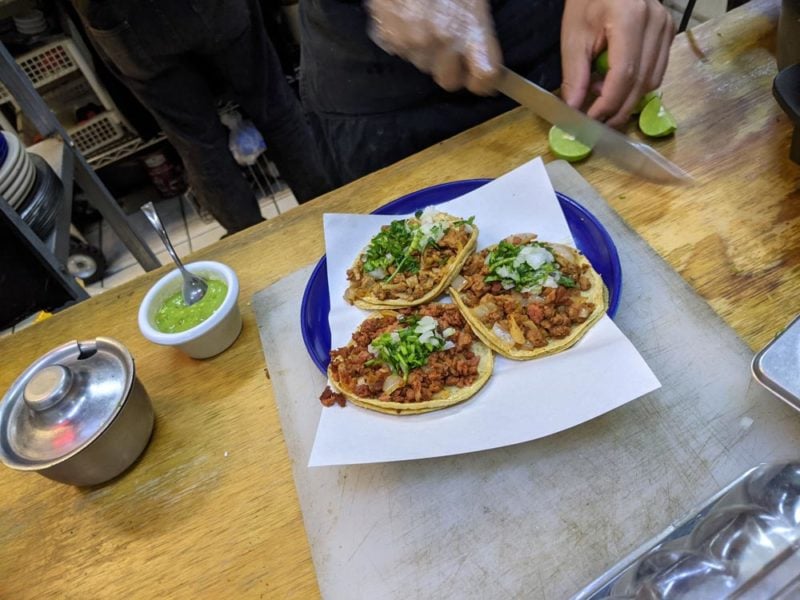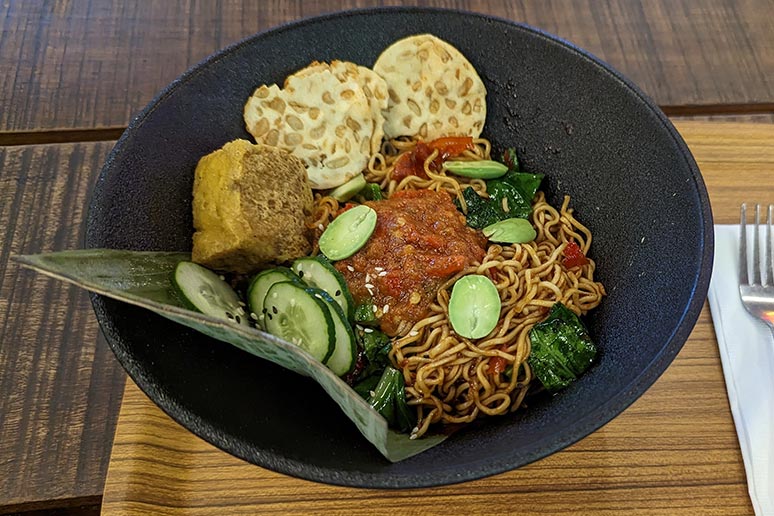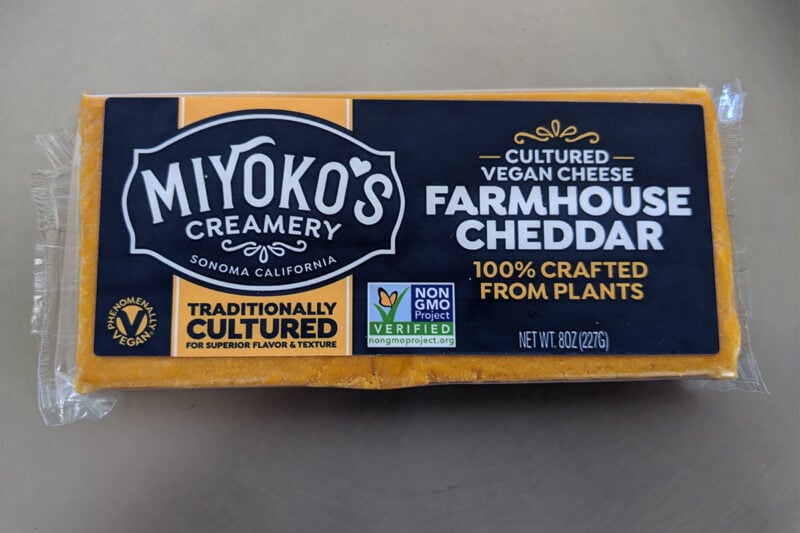Being vegan in college is easy. Practically every campus dining hall serves excellent vegan food, and many schools also have strong vegan communities. In this short guide, I’ll offer advice that will make your vegan college life easier and more fulfilling. We’ll tackle three subjects:
- Eating vegan in campus dining halls
- Vegan food options in dorms and off-campus
- Vegan advocacy involving campus vegan clubs
As we are about to see, you can thrive as a vegan college student no matter which school you attend. At a large university campus in a major city, your vegan options will be endless.
Being Vegan in College
It’s possible to eat sensational vegan food throughout your college years. In fact, every year tens of thousands of people successfully go vegan in college. Making the transition on campus often couldn’t be easier. If you’re new to eating vegan and want additional guidance, you can get started by checking out my “How to Go Vegan” guide.
The best way to ensure you have abundant dining options in college starts before you select a school. When you’re deciding which schools to apply to, spend a little time researching the vegan dining options at each campus. Many schools require their first and second year students to join the meal plan. Often, you’ll pay a flat fee that covers all meals eaten in the dining hall.
If your college makes a meal plan mandatory, you should make sure they’ve got excellent vegan offerings. That will ensure you get the most food for your meal plan money, and aren’t constantly tempted to eat off campus.
How to Find Out if a Dining Hall is Vegan-Friendly
Most dining halls have their own web page on their college website. This page will usually give you a good sense of the dining hall’s vegan offerings. If the page makes no mention of vegan foods, that’s a definite red flag.
Hopefully, during your college search, you will have the chance to tour the campuses of the schools that most interest you. If so, definitely use this opportunity to visit the dining halls to see what they serve on a typical day. If you can purchase a meal during your visit, definitely do so. Dining hall quality varies dramatically from one school to the next, especially where vegan options are concerned.
Some dining halls are a vegan paradise. The best such facilities often have “vegan stations” where every item is vegan. Often they’ll vary cuisines at these stations each day, so there’s no chance you’ll grow bored with the food.
The quality of the food you eat in college can contribute greatly to your overall happiness, so it’s reasonable to carefully consider each school’s dining options. If I had a hard time choosing between two schools that granted me admission, the quality of their respective dining options would certainly factor into my decision.
Dorm Room Snacks and Off-Campus Eating
At many colleges, students are obliged to spend their first year or two living on campus. If you live in a dorm, you probably won’t be able to cook for yourself. Many campuses have rules against toasters and hot plates in dorms, since these appliances pose a fire hazard. But you can certainly load up a bedroom dorm refrigerator with satisfying vegan staples. Nut butters, hummus, and soy milk are obvious choices.
I’ve written a complete guide to vegan dorm food. Also, the Vegan.com grocery contains a number of convenient foods perfect for dorm life—items that are frequently unavailable locally.
Local Restaurants and Natural Food Stores
Another factor to consider when choosing a college is whether there are vegan-friendly restaurants located near campus. You can use Google Maps or Happy Cow to scout out those possibilities. Don’t underestimate how much a terrific falafel restaurant close to your school can add to your quality of life. Most universities and large colleges also have restaurants right on campus, that range from homey coffee shops to Taco Bells. While you’re researching all this, don’t forget to check into whether there are any natural foods stores near the colleges on your list.
If you’re on the school meal plan, you probably won’t buy groceries or eat out often. But when you ultimately move off campus, you’ll appreciate having access to vegan-friendly restaurants and a good natural foods store.
Your First Vegan Kitchen
At some point in your college life, you’ll probably move off campus. This will probably be the first time you get your own kitchen. If so, you’ll gain an unrivaled opportunity to improve your cooking skills. During college, I regarded cooking a meal or snack as the perfect study break. Anytime I did a little cooking, I invariably felt more centered and relaxed when I returned to my books. And every month my cooking skills improved a little bit more.
Looking back, I now realize that basic vegan cooking is one of the best skills you can pick up during your college years. If you’re new to cooking, my vegan cooking guide will introduce you to all the basics. My vegan snack guide will also come in handy. And for foods that are either ready-to-eat or that you can make in minutes, see my guide to easy vegan foods.
Cookbooks and Kitchenware
When the time comes to move off-campus, pick up an easy vegan cookbook like Gaz Oakley’s Plants Only Kitchen. You might also want to purchase the College Vegan Cookbook, which offers a well-organized collection of cheap and easy meals. Perhaps also pick up a thick vegan reference cookbook that has every recipe under the sun—check our vegan cookbooks page for recommended titles. But remember that most of your day-to-day cooking will probably be from cookbooks that focus on quick and easy recipes.
When you move off campus, you’ll probably need to outfit your new kitchen with basic appliances and equipment. A little money can go a long way, when it comes to enabling you to cook a greater diversity of meals. See our kitchenware guide for an assortment of useful equipment that’s geared toward vegan cooking needs.
During my college years, I wasn’t yet vegan when I moved off campus. Having my own kitchen definitely sped up my transition. Once I had my own place to live, I decided to never bring animal products into it. After entirely vegan at home for a few months, I felt ready to go vegan full-time.
Campus Activism and Vegan Advocacy
College life offers unparalleled opportunities to take up activist causes. And vegan activism offers especially exciting opportunities for college students. Here’s why:
- You may have more free time to work on activism projects than you will later in life.
- It’s easy to start or join a group.
- It’s likewise easy to get your club significant funding from your school.
- You’re surrounded by hundreds of students who are at the age when people are most receptive to dietary change.
- Your club can very likely inspire the campus dining halls to improve their vegan offerings.
No matter their major, college students often spend the bulk of their time completing assigned projects and studying for various exams. Campus activism lets you be self-directed, choose your own projects, and create something out of nothing. In this respect, activism cultivates talents that academic coursework won’t normally develop.
Now let’s consider what it takes to start and maintain a college vegan club.
Joining or Starting a Vegan Group at Your College
To get involved in vegan activism on campus, first find out if your school already has an active group. Your college’s website ought to have a page linking to every club on campus. Check this list and, if you find a vegan or animal rights club, contact them.
If no relevant group exists on campus, why not start your own? Simply fill out the appropriate paperwork with your campus student body organization. You’ll probably have an easy time recruiting your first members. At the start of each new term, most colleges and universities host “club days.” Every student group, sorority, and fraternity sets up a table at these events to attract new members. So just arrange to get table of your own, and you can attract your vegan club’s founding members within hours.
When tabling, here’s an important and non-obvious piece of advice: bring your laptop for collecting names and email addresses. Do not ask people to write this information down on paper. Many people have shockingly illegible handwriting. I’ve found during my own tabling that at least ten percent of the handwritten email addresses I acquire are illegible.
Activist Projects For Campus Vegan Groups
Let’s now turn to the best opportunities for campus activism.
If your dining hall’s vegan options are lackluster, you’ve got an important opportunity to take action. Remember, your dining hall director’s job is to cater (literally!) to student preferences. Simply getting your dining hall to expand its vegan offerings by one or two items can lead to a massive reduction in the amount of meat eaten on campus.
Come up with a game plan for some easily-made improvements that would significantly upgrade your dining hall’s vegan offerings. Next, have the most socially poised person from your group schedule a meeting with the dining hall director in order to present your group’s requests. As with all other activism, you want to strive for friendly dialog that greases the wheels for change. A respectful tone can accomplish so much. Your Dining Hall Director has almost complete control over the campus menus. At all costs, seek to have this key person become a partner rather than an adversary.
Bringing Public Speakers to Campus
All universities maintain an annual budget for guest lectures and musical performances. Your campus group can tap into this action by applying for funds to bring in a speaker. Hosting an event offers a fantastic opportunity to expose your school’s student body to topics related to veganism, health, environmental issues, and factory farming.
Try to invite someone who is expert at talking about veganism in ways that appeal to non-vegetarians. Ideally, this can will be someone able to attract and inspire a mostly non-vegetarian audience. At all costs, avoid inviting someone from the fringes of the animal rights movement who comes across as an angry radical.
Ideally you want somebody who can make a strong case for going vegan, and who can also convey how easy it is to start eating more plant-based foods. Most potential speakers have videos on YouTube, so be sure to watch some of their videos to help you decide who to invite.
Once you’ve invited somebody, ask them which talk titles seem to draw the biggest crowds. Also see if you can get some free vegan food to serve at the event. Perhaps some club members can bake cookies. Or a local vegan restaurant or natural food store might donate food, especially if you do a good job of acknowledging the gift. Publicizing that your event offers free vegan food can dramatically increase the audience, since college students love free food.
Campus Leafleting
Every major vegan nonprofit organization publishes vegan pamphlets intended to be handed out on college campuses. They’ll often send these pamphlets to you for free.
On a busy campus I’ve been able to pass out nearly 300 pamphlets an hour. I think leafleting in this manner is one of the most effective ways to acquaint college students with the issues related to vegan diets and farm animal abuses.
Success Means Succession
Over time your campus group can build a strong core group of activists. Working together, you can collectively boost veganism on campus in a variety of important ways.
As you enter your junior and senior years, it’s crucial to prepare underclassmen to carry the torch after you graduate. That means putting the most committed first-year students into positions of responsibility.
Time after time, I’ve witnessed superbly run student groups dissolve after their leadership graduates. These leaders often did amazing work but failed to groom up-and-coming activists to take over. So always look to the future, and make sure next year’s plans are thought through. No responsibility associated with running a college vegan group is more important than recruiting future leadership.
That does it for my college-specific activism advice. For a fuller background on everything you might accomplish, please see my lengthy guide to vegan activism.
Being Vegan in College is Easy
Eating vegan in college is never difficult. In fact, it’s during college that many vegans learn to eat better than ever before.
College offers so many opportunities to discover new food and to elevate your cooking abilities. And if you join or start a vegan club, you’ll gain the ability to dramatically improve campus dining options, while exposing your fellow students to compassionate eating.














